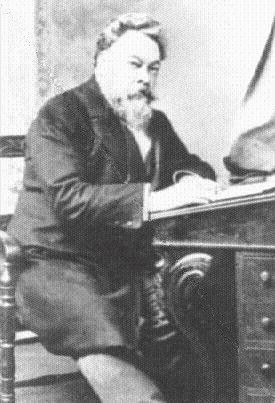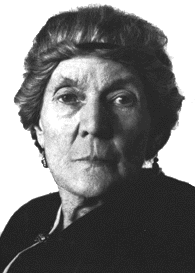 James Compton Burnett MD (Glasgow 1872) (20 July 1840 – 2 April 1901) was a British orthodox physician who converted to homeopathy. He worked at the London Homeopathic Hospital and in private practice, and he succeeded Edward Barton Shuldham as editor of The Homeopathic World.
James Compton Burnett MD (Glasgow 1872) (20 July 1840 – 2 April 1901) was a British orthodox physician who converted to homeopathy. He worked at the London Homeopathic Hospital and in private practice, and he succeeded Edward Barton Shuldham as editor of The Homeopathic World.
James Compton Burnett’s first wife Agnes was the daughter of homeopathic pharmacist Edward Thomas. They had six children together. With his second wife, Katharine Rees, Burnett had seven more children, including the novelist Dame Ivy Compton Burnett. He was also the great uncle of royal homeopath Dr. Margery Grace Blackie.
James Compton Burnett was a contemporary of William Bayes, Charles Harrison Blackley, John Galley Blackley, David Dyce Brown, George Henry Burford, John Moorhead Byres Moir, John Henry Clarke, H A Clifton Harris, Robert Thomas Cooper, R M Le Hunt Cooper, Paul Francois Curie, Robert Ellis Dudgeon, John Epps, Washington Epps, Giles Forward Goldsbrough, Clarence Granville Hey, Ethelbert Petrie Hoyle, Richard Hughes, James Johnstone, Thomas Robinson Leadam, Octavia Margaret Sophia Lewin, Edward M Madden, Henry R Madden, David MacNish, Edwin Awdas Neatby, Alfred Crosby Pope, Mathias Roth, Edward Wynne Thomas, C T Knox Shaw, Charles Edwin Wheeler, John Weir, David Wilson, James Craven Wood, Dudley d’Auvergne Wright, Stephen Yeldham and many others.
James Compton Burnett was born in Redlynch, near Salisbury, in 1840, to a farming family of Scottish descent, his father Charles Burnett (1811 – 1883) and mother Sarah Wilson (1805 – 1882). From age 16-19, Burnett was sent to school in France, and from there he traveled the Continent.
He chose medicine as a career and attended medical school in Vienna in 1865, where he remained 2 additional years studying anatomy, receiving a gold metal for his accomplishments in that field.
“Passing through a brilliant examination in anatomy, lasting one hour and a half, the professor shook hands with him, saying that he had never examined a student with so brilliant and thorough a knowledge of anatomy.”
Burnett was introduced to homeopathy during his internship by his friend and colleague Alfred Edward Hawkes. He was also a contemporary of Richard Hughes, Robert Ellis Dudgeon, and John Henry Clarke.
He studied homeopathy in Liverpool under John James Drysdale and Edward William Berridge, at first very secretively for fear of reprisals from allopathic colleagues.
After practicing for a time in Birkenhead and Chester, Burnett relocated to London where he was homeopathic physician to Lewis Carroll, among many other patients.
In 1881 Burnett was one of the two local secretaries for the 2nd Quinquennial International Homeopathic Congress held in London on 12 – 16 July at Aberdeen House, Argyll Street.
Throughout the 1880s and 1890s Burnett was one of the four notable homeopathic physicians who became known as the “Cooper Club.” These men, Burnett, Robert Thomas Cooper, Thomas Skinner, and John Henry Clarke, met and dined weekly and shared their notes and experiences. They had a major influence on British homeopathy.
Later in his career Burnett ran two busy medical practices in London, at Finsbury Circus and Wimpole Street, although he resided in Brighton.
Burnett busied himself not only with his thriving consulting practice and prodigious writing output, but he also contributed to the homeopathic materia medica. He introduced a number of nosodes: Bacillinum Burnett, Coqueluchinum, Carcinosinum, Epihysterinum, Ergotinum, Morbillinum, and also Schirrinum and possibly Influenzinum.
In addition to the influence of homeopathy in his work, Burnett was inspired by a contemporary of Samuel Hahnemann‘s, the Paracelsian Johann Gottfried Rademacher. Burnett combined homeopathy with Rademacher’s “organopathy,” explaining that Rademacher was as much a hero to him as Hahnemann, for “it seems to me that organopathy and elementary homeopathy are identical.”
James Compton Burnett died suddenly of heart failure at his hotel in London during the night of Monday, April 1st 1901, two months before daughter Ivy’s seventeenth birthday” [Obituary, British Journal of Homeopathy, 1901]
Burnett’s older brother, John, a Congregational Minister in Bedford, died just two weeks before him, on 21 March 1901.
John Henry Clarke wrote of Burnett, “It is not too much to say that during the last twenty years Burnett has been the most powerful, the most fruitful, and the most original force in homoeopathy”
Select Publications:
- Natrum Muriaticum as Test of the Doctrine of Drug Dynamization (1878)
- Gold as a Remedy in Disease (1879)
- Curability of Cataract by Medicines (1880)
- The Medicinal Treatment of Diseases of the Veins (1881)
- Supersalinity of the Blood (1882)
- Vaccinosis and Its Cure by Thuja (1884)
- Diseases of the Skin From the Organismic Standpoint (1885)
- Diseases of the Spleen and Their Remedies Clinically Illustrated (1887)
- Fifty reasons for Being a Homeopath (1888)
- On Fistula and Its Radical Cure by Medicines (1889)
- On Neuralgia (1889)
- Five Years Experience in the New Cure of Consumption by Its Own Virus (1890)
- The Diseases of the Liver (1890)
- The Greater Diseases of the Liver (1891)
- Ringworm: Its Constitutional Nature and Cure (1892)
- Curability of Tumours (1893)
- Tumours of the Breast and their Cure (1893)
- Delicate, Backward, Puny, and Stunted Children (1895)
- Gout and Its Cure (1895)
- Organ Diseases of Women (1896)
- The Change of Life in Women and the Ills and Ailings Incident Thereto (1898)
- Enlarged Tonsils Cured by Medicines (1901)
Of interest:
 Dame Ivy Compton Burnett, DBE 1884 – 1969 was an English novelist.
Dame Ivy Compton Burnett, DBE 1884 – 1969 was an English novelist.
Dame Ivy Compton Burnett, D.B.E., was born in 1884 in Pinner, England, the seventh child of a leading homeopathic physician, Dr James Compton Burnett.
She was the first child of his second marriage; her mother, Katharine Rees, was a beautiful, delicate, imaginative, imperious and highly competitive woman who had met her future husband as his patient, and fallen passionately in love with him.
Their devotion was mutual and, when Dr Burnett’s first wife died in childbirth, he remarried so promptly that Ivy was born less than two years after her last half brother.
Her mother inherited five small stepchildren (one had already died in infancy), ranging in age from eight years old down to the new baby, and over the next fifteen years she bore seven more of her own.
The Burnett family moved to a large house on the south coast at Hove, Sussex, although Dr. Burnett spent the greater part of each week in town, immersed in the demands of a rapidly expanding London practice.


JCB’s contribution to homeopathy came at very high cost to his personal family life.
Comment left on https://www.hahnemannhouse.org/british-homeopathic-associations-and-journals/on 15.5.13 by Barry Shaw
Dear Sue Young,
Though I have not yet found out when Dr. Edgar Whitaker died, I have found out the following information with regard to who he was and his relationship to the journal, The Homœopathic World.
His full name is Leonard Edgar Whitaker, and he was born in about 1876. (1) He was the son of the Joseph Whitaker, a publisher of a wide variety of material including theological and books on the publishing trade. He is best known as the editor and publisher of Whitaker’s Almanack. (2)
The Almanack was published by J. Whitaker and Sons from 1868 – 1997, with Joseph Whitaker its editor from 1868 – 1895, with his son, Cuthbert Wilfred Whitaker, taking over after his father’s death in 1895. (3)
In the December 1931 number of The Homœopathic World, in an article entitled, ‘John Henry Clarke, An Apperciation’ Dr. Whitaker says that it was after Dr. Compton Burnett edited his last number of The Homœopathic World in April 1885, that Joseph Whitaker
‘. . took over the whole of his business and removed it to the present office . .’. (4)
Dr. John Henry Clarke commenced as editor the following month in May 1885. (4) The journal was published by The Homœopathic Publishing Company of 12 Warwick Lane, E.C.4. (5)
A list of London Publishers and Printers 1800-1870 gives Joseph Whitaker as being at 12 Warwick Lane from 1887 until his death in 1895. (2)
Edgar Whitaker in the 1901 UK census is given as being 25 years old, with the qualifications M.R.C.S., L.R.C.P., and his occupation as surgeon. In 1903 he married Evelyn Olave Cox. (1) In 1937, at the probate of the will of Edith Louisa Nimmo (his sister) he is given as being a publisher. (6)
In the December 1931 number of The Homœopathic World, Dr. Whitaker also states that
‘. . as Manager of the parent firm also I am so busy all day long.’ (7)
I take this to mean that the parent firm of The Homœopathic Publishing Company was J. Whitaker and Sons.
Why J. Whitaker and Sons would publish homœopathic books under a different name is understandable from the following quote from ‘The Faces of Homœopathy’ by Julian Winston:
‘Noting that “Dr. Ruddock had been compelled to keep his publishing department in his own basement,” Clarke established his own publishing house for his books – The Homeopathic Publishing Company – for no reputable publishing house wanted to touch “what was ‘officially’ anathema.”’ (8)
The above quotation appears to be not quite right. Dr. Edward Harris Ruddock founded The Homœopathic World in 1865. Dr. Edgar Whitaker says it was published from 2 Finsury Circus until 1885 when Joseph Whitaker took over. (4)
This information appears to suggest that J. Whitaker and Sons should be given credit for publishing the The Homœopathic World under the name of The Homœopathic Publishing Company, rather than its editor John Henry Clarke.
What do you think?
Yours faithfully
Barry Shaw
References
1. https://www.werelate.org/wiki/Person:Leonard_Whitaker_%281%29
2. https://www.werelate.org/wiki/Person:Joseph_Whitaker_(9)
3. https://en.wikipedia.org/wiki/Whitaker's_Almanack
4. Whitaker, Dr. E. (Jan. 1932) John Henry Clarke – An Appreciation in The Homœopathic World, The Homœopathic Publishing Company, London; page 7.
5. The Homœopathic World, (Dec. 1931) the Title page shows it was published in London: The Homœopathic Publishing Co., 12 Warwick Lane, E.C.4
6. https://www.werelate.org/wiki/Person:Edith_Whitaker_(4)
7. Whitaker, Dr. E. (Jan. 1932) John Henry Clarke – An Appreciation in The Homœopathic World, The Homœopathic Publishing Company, London; page 10.
8. Winston, J. (1999) The Faces of Homœopathy, Great Auk Publishing, Tawa; page 185.
🙏🏻🙏🏻
Can anyone please tell me in which book of Dr.Burnett , the remedy Epihysterinum ( for uterine tumours) is mentioned??
Thank you for your query Dr. Dutta. We’re looking into this for you.